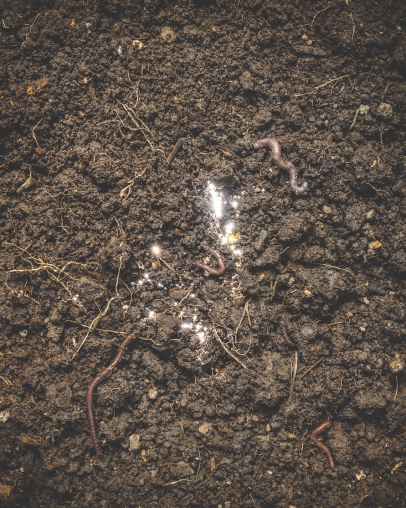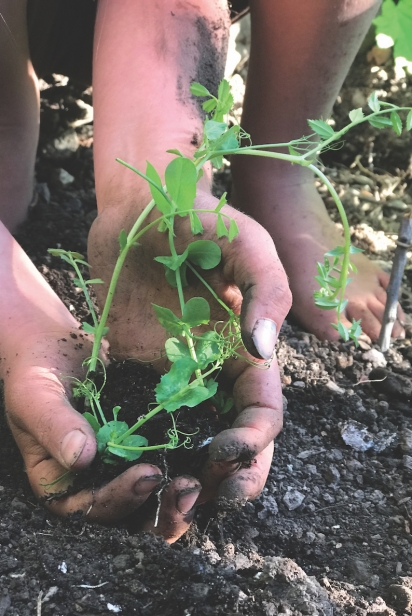A Dirty Secret
Fall is a busy time on the farm, not only for harvesting vegetables but also preparing for winter: canning, sorting veggies to store in the root cellar, and the always-fun process of making kimchi. As soon as the abundant ingredients for this fermented treat — napa cabbages, carrots, daikon radishes, onions, garlic, and spicy peppers — are pulled from the ground, my crew at the Farm Collaborative dives in: chopping cabbages, measuring out salt, and massaging and punching down the cabbage to draw out its juices. One thing we don’t do is wash the cabbages.
Yes, you read that right: We do not wash the cabbages. That’s because we actually want the little bit of soil remaining on the leaves — and all the friendly bacteria it contains — to help jump-start the fermentation process, which in turn results in a magical concoction that works wonders on our gut biome. And it’s not just the lactobacillus (a probiotic naturally occurring in the human digestive tract) generated through this process that is so healthy for us, but also many of the soil microbes that we consume with our fresh garden veggies.
If you take a good close look, you will see that soil is teeming with life. All you have to do is grab a fresh handful from underneath the plants and watch for a moment — you’ll see worms and other living things moving around. And that’s just what’s visible to the naked eye; millions of microscopic creatures are part of this system, too.
A well-balanced, healthy soil ecosystem is one of the most diverse living systems in the world. Scientists have found that just one teaspoon of good soil can contain up to one billion bacteria, along with tens of thousands of species of fungi, protozoa, nematodes, and other microbes. In a symbiotic relationship with vegetables and other food crops, these microbes unlock nitrogen and other micronutrients in rocks and minerals and make them available to the plants to grow.
Parallel discoveries into the soil microbiome and the human microbiome are proving that beneficial microbes are not only critical to the health of soil and plants, but to our own bodies as well. If enough beneficial soil microbes work symbiotically with plants, they will out-compete the pathogens that are trying to attack and make the plants sick. Our gut biome works similarly: If we feed it enough diversity of nutrient-dense foods that contain enough good microbes, they out-compete the pathogens that make us sick.
In addition to aiding our gut biome, healthy living soil directly impacts the concentration of nutrients in the foods we consume. According to several studies, the nutrient density of fruits and vegetables grown in the United States has greatly declined over the last 50 to 70 years, leaving many Americans with sufficient calories but not enough nutrients vital for good health. Ever since the Green Revolution of the 1950s and ’60s, which greatly increased agricultural production but came with the idea that we needed synthetic chemicals to grow enough food to feed everyone, we’ve been suffering a loss of topsoil and the rich network of life in it. This is because of harmful chemicals, like glyphosate, and the practice of tilling: flipping the soil to kill weeds and the remnants of the last crop, in order to prepare the soil for new seeds. Losing this topsoil also means losing the nutrients in our food.
In the gardens at the Farm Collaborative, much of our purpose is to build soil — or rather, to feed the life within the soil. With regenerative practices such as minimal tilling, cover cropping, and spraying compost teas, we strive to care for the incredible web of life under our feet. If we take care of it as such — as a diverse living network that’s interconnected with all the life around it — and plant a diverse network of crops and trees, we help to nurture not only the soil and plant life but also our own lives.
When I walk barefoot through the garden, I know that some of those tiny beneficial creatures cling to my feet — and I’m OK with that. Our greatest helpers in the garden are helping our bodies as well. And when we don’t wash the cabbages while making kimchi, it brings a smile to my face knowing that the microbes helping the fermentation process will also be doing good for my gut, my immune system, and my health in general.
Marieta Bialek is the Farm Collaborative’s soil and production manager and a farmer for over 10 years. Her farm experience includes working on organic and biodynamic farms in Boulder and at the CSU Organic Agriculture Research Station in Hotchkiss, where she planted orchards and helped restore perennial pastures. She earned her degree in ecological and evolutionary biology at the University of Colorado at Boulder in 2014. Growing up in Aspen, Bialek developed a love for the planet through hiking, backpacking, and camping.





